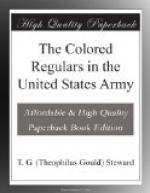The regiment merged into open space in plain view of and under the fire of the enemy; and formed line of battle facing toward the blockhouses and strong intrenchments to the north, occupied by the Spanish, and advanced rapidly in this formation, under a galling, converging fire from the enemy’s artillery and infantry, on the blockhouses and heavy intrenchments to the right front. Many losses occurred before reaching the top of the hill, Lieut. W.H. Smith being killed while gallantly conducting his troop as it arrived on the crest. Lieut. W.E. Shipp was killed about the same instant, shortly after leaving Lieutenant Smith, further to the left and near the pond on the sunken road leading to Santiago. Lieutenant Smith was struck in the head and perished with a single groan. Lieutenant Shipp was hit near the heart; death must have been almost instantaneous, though it appears he made an effort to make use of his first aid package. Thus the careers of two gallant and efficient officers whose lives had been so closely associated were ended.
Private Slaughter, who was left in charge of Lieutenant Smith’s body, was picked off by the Spanish sharpshooters, and Private Jackson, Lieutenant Shipp’s orderly, was left as deaf as a post from a bursting shell.
The enemy having been driven back, northwest, to the second and third blockhouses, new lines were formed and a rapid advance made upon them to the new positions. The regiment assisted in capturing these works from the enemy, and planted two sets of colors on them, then took up a position to the north of the second blockhouse. With some changes in position of troops, this line, one of the most advanced, about three hundred yards of the enemy, was held and intrenchments dug under a very heavy and continuous fire from the Spanish intrenchments in front, July 2 and 3.
In their retreat from the ridge, the enemy stood not on the order of their going, but fled in disorder like so many sheep from the scene, abandoning a quantity of ammunition, which was fired at them subsequently from our rapid-fire guns. Our men were too exhausted to pursue them, footwear and clothing being soaked by wading rivers, they had become drenched with rain, and when they reached the crest they were about played-out; having fought about 12 hours, most of which was under that ever-relentless tropical sun.
Throughout the night, work on the intrenchments was pushed, details buried the dead, improvised litters, and conveyed the wounded to hospitals, all of which was prosecuted with that vim for which the regular soldier is characterized, notwithstanding their water-logged condition.
The regiment acted with extraordinary coolness and bravery. It held its position at the ford and moved forward unflinchingly after deployment, through the dense underbrush, crossed and recrossed by barbed wire, under heavy and almost plunging fire from the Spanish works, while attacking with small arms an enemy strongly posted in intrenchments and blockhouses, supported by artillery, and who stubbornly contested every inch of ground gained by the American troops.




